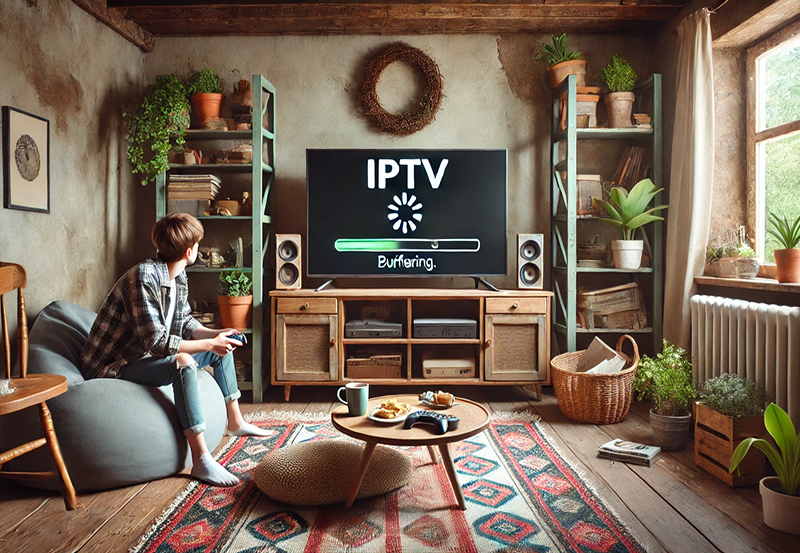With the increasing shift towards digital content streaming, many users rely on IPTV services for their entertainment needs. However, router-related issues can disrupt this seamless experience. In this guide, we’ll explore strategies to protect your IPTV streaming from these common hiccups.
Understanding Your IPTV Setup
Before diving into router solutions, it’s crucial to understand the basic setup of your IPTV system. Your experience with Smarters IPTV or watching international channels can vary greatly depending on your network quality. Knowing how your IPTV is connected and configured is the first step in ensuring a smooth streaming experience. Buy 1 Year IPTV and Enjoy Unlimited Content
The Basics of IPTV
IPTV, or Internet Protocol Television, enables users to watch TV channels over a high-speed internet connection rather than traditional terrestrial, satellite, or cable formats. This can include live TV, video-on-demand, and a myriad of international channels that redefine your viewing options.
Common Issues with IPTV Streaming
Many users face buffering, lagging, or complete disconnects while using IPTV services. Often these issues are tied to the router’s performance. Factors such as bandwidth, network congestion, and signal interference play a critical role.
Bandwidth Problems
Bandwidth issues occur when there’s insufficient capacity to manage data from your IPTV service. These problems often manifest during peak usage hours when many devices are connected. A lack of bandwidth can cause significant buffering.
Network Congestion
Network congestion is another common hurdle. It happens when data packets are delayed because the network is overloaded. This is particularly common in urban areas with densely packed users fighting for the same network resources.
Optimizing Your Router for IPTV Streaming
Now that we’ve outlined some common problems, let’s delve into solutions. Optimizing your router settings can enhance streaming quality and reduce disruptions.
Selecting the Right Router
The first step is ensuring you have a router capable of handling IPTV streams. Not all routers are created equal; some are designed to deliver smoother video streams across multiple devices.
- Choose a router with QoS (Quality of Service) feature to prioritize IPTV traffic.
- Ensure the router supports the latest wireless standards like 802.11ac for optimal performance.
- Consider dual-band routers that can separate IPTV traffic from other devices.
Configuring Router Settings
Proper configuration can greatly improve your IPTV experience. Focus on router placement, channel settings, and firmware updates.
Router Placement
For the best signal, place your router centrally in your home, away from walls and obstructions. Height can also affect signal strength; placing the router on a shelf or high furniture can sometimes yield better results.
Channel Settings
Adjusting your router’s channel settings can reduce interference from neighboring networks. Auto-select features on modern routers can automatically choose the best channel, but manual adjustments can sometimes provide improvements.
Security Measures to Prevent Router Issues
Beyond the technical setup, security is crucial in maintaining stable and secure connections for IPTV streaming. Here’s how you can safeguard your router.
Router Firmware Updates
Regular updates to your router’s firmware can patch vulnerabilities and improve performance. Manufacturers release these updates to enable better compatibility with services like Smarters IPTV.
Network Security Settings
Securing your network is as important as the signal strength. Set up strong passwords and disable remote management to prevent unauthorized access. WPA3 is the current security standard and provides robust protection.
Using Strong Passwords
A strong password comprises a mix of letters, numbers, and symbols. Avoid common words or repeating sequences. This simple measure can greatly reduce the risk of intrusion.
Disabling Unneeded Features
Many routers come with features like remote management and WPS (Wi-Fi Protected Setup) enabled by default. While they offer convenience, they can also be security risks if not properly configured.
Improving IPTV Performance on Networks
Making specific adjustments to your network setup can enhance IPTV streaming, ensuring a more enjoyable viewing experience.
Implementing Wired Connections
Whenever possible, use wired connections instead of wireless. Ethernet cables provide more stable connections, especially over longer distances and through thick walls, resulting in a more stable IPTV performance.
Utilizing VPN Services
VPNs can boost IPTV streaming by reducing throttling from ISPs and maintaining privacy in your viewing habits. Select a high-speed VPN provider for the best results without compromising speed.
Addressing Common Router-Related Problems
Some issues persist despite your best efforts. Let’s address solutions to common stumbling blocks in the IPTV context.
Dealing with ISP Throttling
Internet Service Providers (ISPs) sometimes throttle streaming speeds to manage network traffic. To combat throttling, consider a VPN to keep your activity private and maintain better speeds for IPTV services.
Managing Device Connections
Limit the number of devices connected at peak times, as too many active connections can drain bandwidth and cause buffering issues. Setting a schedule can help manage demand during high traffic hours.
Fine-Tuning Your IPTV Experience
Simple adjustments and periodic checks can keep your IPTV experience smooth and enjoyable. Whether using IPTV for international channels or exploring new services, these tips will enhance your viewing pleasure.
Regularly Monitor Performance
Keep an eye on your IPTV performance periodically. Observing when issues occur can provide clues about potential fixes, such as rescheduling your viewing times or switching service gears.
Explore IPTV Services
Market variety allows flexibility in service choice. Some might have better server locations or incorporate technology that optimizes for different regions. Diversifying your service providers can sometimes solve ongoing issues.
FAQs: Protecting Your IPTV Streaming from Router Issues

Why is my IPTV buffering so much?
Buffering often results from bandwidth limitations, network congestion, or router configuration issues. Ensuring your router is adequately set up and your network isn’t congested can help reduce buffering.
How can I secure my IPTV connection?
Keep your router firmware updated, use strong passwords, and ensure that your network uses the latest security protocols like WPA3. These measures will shield your connection from potential threats.
Does a VPN improve IPTV streaming?
A VPN can help bypass ISP throttling, enhancing streaming speed and privacy. Choose a reliable VPN with good bandwidth to avoid introducing new latency issues.
Can router placement affect IPTV quality?
Yes, a centrally placed router without obstructions can significantly improve signal quality, leading to better IPTV streaming. Heights can also influence signal reach positively.
What role do bandwidth and data caps play?
Limited bandwidth and data caps can throttle IPTV streaming. It’s crucial to manage the number of connected devices and ensure your plan accommodates your streaming needs.
Are there any specific routers recommended for IPTV?
Routers supporting QoS, the latest wireless standards, and dual-banding capabilities are recommended. Researching and selecting a model designed for high video traffic can improve IPTV performance.
How often should I update my router’s firmware?
Check for firmware updates monthly. Frequent updates ensure your router maintains optimal performance and security, providing a seamless IPTV watching experience.
Effortless Streaming with Lazy IPTV: Setup Guide for Beginners





